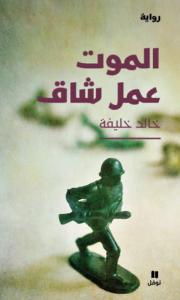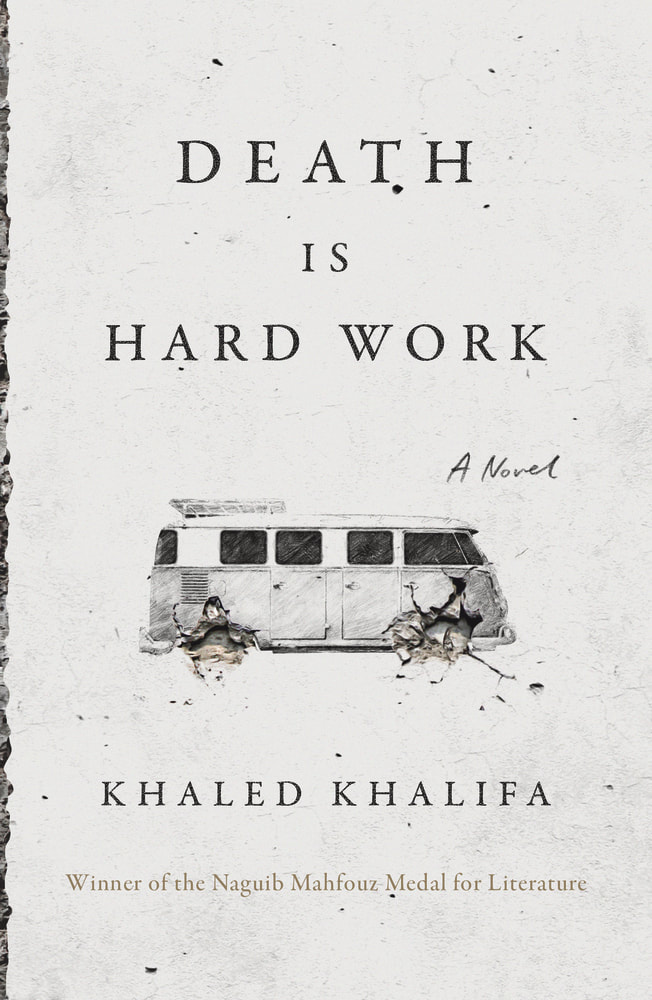|
by Rana Asfour 'Death is Hard Work' by Syrian author Khaled Khalifa is a satirical novel set in a war-ravaged Syria, that meditates on death and dying, love and revenge in a place where fear has become everyone's sole true enemy. The English-language translation will be released by Farrar, Strauss and Giroux, on February 12, 2019 'The shame and the silence they had lived through for years were exacting a price, and everyone would pay it, executioners and victims alike'. - 'Death is Hard Work' by Khaled Khalifa In a 2016 interview with Arablit.com, Syrian author Khaled Khalifa disclosed that ‘When you live in a war, in the middle of the regime’s daily reproduction of hysterical fascism, you ought to acquire new habits in order to stop yourself from reproducing fear.’ He conceded that the three worst habits he has since accrued, in a Syria he has refused to leave since the outbreak of the ongoing unrest, have been lethargy, forgetfulness and scepticism in everything being said. And yet, despite his newfound coping techniques, he attributes his overall success in dodging death so far as down to nothing more than ‘chance’. And this brings us to the author’s recent novel ‘Death is Hard Work’ which deals with war and the ravaging metamorphosis it impinges not only on a geographical space but also on the psychology of its dwellers who have to deal with the exceptional becoming habitual, and tragedies labelled mundane. 'Everyone who loses their pride becomes a miser of a sort; their self-importance increases, their eyes die out, and their resentments accumulate,' writes Khalifa at one point. Translated by Leri Price, who also translated Khalifa’s ‘In Praise of Hatred’ that was a finalist for the IPAF prize as well as his fourth novel ‘No Knives in the Kitchens of This City’, that won the Naguib Mahfouz Medal for Literature in 2013, the novel will see its English-language publication this February. In this latest novel, set in a ravaged Syria four years in which a Civil War has now restyled into a war by proxy, and death has become so commonplace and robbed of its usual distress to the extent that the inhabitants of the city have come to look upon the living as simply ‘pre-dead’, Abdel Latif surprises everyone by dying of natural causes in his hospital bed in Damascus. His final wish, he reveals on his deathbed to his eldest son Bolbol, is to be buried in the family plot in their ancestral village of Anabiya situated in the Aleppo region. Though Abdel was hardly an ideal father, and though Bolbol is estranged from his siblings, this son who yearns to ‘go back to his nest and skulk in his room like a rat until his dream of moving to a faraway country’ is realised, nevertheless conscientiously persuades his older brother Hussein (who had been his son’s favourite until he turned pimp and drug dealer) and his sister Fatima to accompany him and the body to Anabiya, which is―after all―only a two-hour drive from Damascus. Naturally in a country where time is now measured by soldiers stationed at checkpoints dotted along their entire perilous journey ‘entitled to pass judgement on any person for any infringement, execute them, and throw them in a mass grave, or else just leave them where they fell for their family to pick up and take away’, the journey takes them days not hours to complete. Despite all that and the fact that Bolbol ‘couldn’t think of anyone having successfully managed to transport a body all the way [to Anabiya] in three whole years’, the siblings are optimistic that they can, until they hit the first checkpoint and the soldiers deliberate on whether or not they are going to arrest the corpse. And so as the hard work of transporting Abdel Latif’s body begins, so do a series of ludicrous, absurd events in which the three siblings negotiate, beg and bribe their way for a safe passage to Anabiya. Along the way we become privy to the reasons behind their estrangement from each other as well as with their father, a delayed ‘revolutionary’ and believer in the redemptive power of love. We hear of Fatima’s sister-in-law’s rape and her fiancee’s abandonment, we hear of how a woman’s six brothers in the Free Army were now forced to fight alongside the Islamic extremists because they had more money, and we are told the story of Layla, Abdel Latif’s sister, a feminist before her time who had paid the ultimate price for her convictions. 'You consider yourself aloof from the oppression and power of the masses, but in the end you realise any individuality you might have seen in yourself is a lie and that you're just one more worn-out pair of shoes walking the streets' - 'Death is Hard Work' by Khaled Khalifa Khalifa captures the general debilitating mood that has laid claim on Syria’s inhabitants so that they are stuck in limbo, terrified to venture into an unknown future while acknowledging the futility of turning back. By confining the characters for most of the novel within the environ of a minibus, with a putrid corpse at such close proximity so that they are ‘breathing death as no one had ever breathed in the death of a loved one’, all while subjugating them to round-the-clock peril in which even the details of their identity card could spell catastrophe, soon creates a claustrophobic cabin fever effect that eventually leads to the most violent and disturbing part of the novel.
Despite the vey sparse dialogue in the novel, and the pervading silence between the siblings, this is far from a quiet novel. Bolbol’s clamorous internal monologue as he meditates on death in general and what his father’s body really means to him, as well as his reflections on his family history, while also agonising over his countrymen’s state of affairs resound with a brutal, cold-hearted, frankness with regards all of humanity. One shudders to contemplate the possibility that Bolbol’s gloomy prognosis on humans and humanity, on death and life, on love and war, on defeat and victory, manifest from the author’s first hand experience of living in today’s Syria. Sadly, judging by the news that filters out every day, it doesn’t seem such a farfetched assumption to make.
0 Comments
Your comment will be posted after it is approved.
Leave a Reply. |
Archives
March 2021
|






 RSS Feed
RSS Feed
